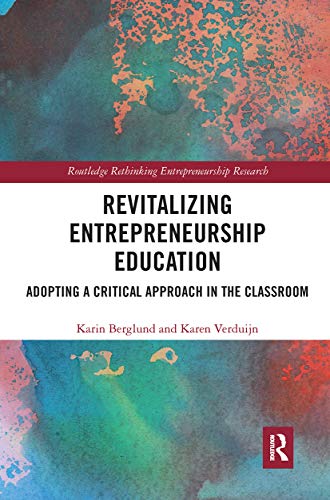Description
Within mainstream scholarship, it’s assumed without question that entrepreneurship and entrepreneurship education are desirable and positive economic activities. Drawing on a wide range of theoretical approaches and political-philosophical perspectives, critical entrepreneurship studies has emerged to ask the questions which this assumption obscures.
Students of entrepreneurship need to understand why and how entrepreneurship is seen as a moral force which can solve social problems or protect the environment, or even to tackle political problems. It is time to evaluate how such contributions and insights have entered our classrooms. How much – if any – critical discussion and insight enters our classrooms? How do we change when students demand to be taught “how to do it”, not to be critical or reflexive?
If educators are to bring alternative perspectives into the classroom, it will entail a new way of thinking. There is a need to share ideas and practical approaches, and that is what the contributions to this volume aim to do and to illuminate new ways forward in entrepreneurship education.
Table of Contents
Foreword by Pascal Dey; Foreword by Malin Tillmar;
Section 1: Setting the scene; Introduction – Challenges for Entrepreneurship Education. Enacting Criticality in the Classroom – Karin Berglund & Karen Verduijn; Chapter 1 – Education or Exploitation? Reflecting on the entrepreneurial university and the role of the entrepreneurship educator – Richard Tunstall;
Section 2: On evoking; Chapter 2 – Entrepreneurship in societal change. Students as reflecting entrepreneurs? – Jessica Lindbergh and Birgitta Schwartz; Chapter 3 – The Reflexivity Grid. Exploring Conscientization in Entrepreneurship Education – Leona Achtenhagen and Bengt Johannisson; Chapter 4 – From Entrepreneurship to Entrepreneuring: Transforming Healthcare Education – Hanna Jansson, Madelen Lek and Cormac McGrath;
Section 3: On moving; Chapter 5 – A space on the side of the road. Creating a space for a critical approach to entrepreneurship – Pam Seanor; Chapter 6 – Conceptual Activism: Entrepreneurship Education as a Philosophical Project – Christian Garmann Johnsen, Lena Olaison and Bent Meier Sorensen;
Section 4: On challenging; Chapter 7 – Bringing Gender In: The Promise of Critical Feminist Pedagogy. Sally Jones; Chapter 8 – Entrepreneurship and the Enterprising Self: Creating alternatives through entrepreneurship education? – Annika Skoglund and Karin Berglund; Chapter 9 – Between critique and affirmation: An interventionist approach to entrepreneurship education. Patrizia Hoyer, Bernhard Resch and Chris Steyaert;
Section 5: On dialogues; Chapter 10 – Moving entrepreneurship – Karen Verduijn; Chapter 11 – On vulnerability in critical entrepreneurship education: A dialogue with students – Anna Wettermark, Oskar Lif, Alice Wickström, Sofie Wiessner and Karin Berglund; Epilogue – Critical entrepreneurship education: a form of resistance to McEducation? – Ulla Hytti








